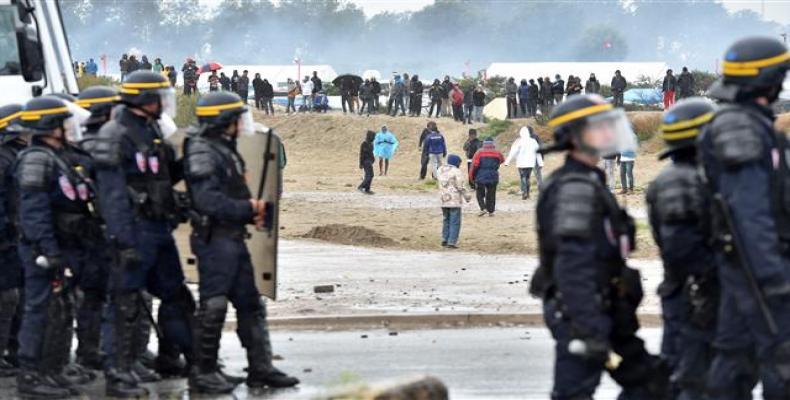Paris, October 3 (RHC)-- French police have clashed with refugees and human rights activists outside a makeshift refugee camp in northern France near the port city of Calais. Riot police ver the weekend used tear gas and water cannon to disperse the protesters who had gathered under a bridge.
Police forced the protesters, who planned to march to the city, back into the camp, while activists threw stones at security forces. Many activists, who had planned to join the protest, were blocked by police at a toll road near Calais.
The protest, which was banned by the city mayor, was held to highlight the dire conditions in the notorious Calais camp nicknamed "The Jungle."
Thousands of refugees fleeing war and poverty in countries such as Syria, Eritrea, Somalia and Afghanistan have converged on Calais over the past two years, waiting there to cross into the UK.
Many attempt to sneak onto trains using the Channel Tunnel or hitch onto trucks headed to Britain, where they hope to integrate into a better life. The Calais camp is grappling with problems such as overcrowding, poor sanitary conditions and food shortages.
According to local authorities, some 7,000 asylum seekers are living in the remaining northern half of the camp, up from 4,500 recorded in June. Humanitarian groups, however, put the number of those residing in the refugee camp at around 9,000.
Last week, French President Francois Hollande vowed to dismantle the Calais camp and block any plan for similar refugee camps in the country.
French Police Clash with Refugees Outside Calais Camp

Articles en relation
Commentaires
Laissez un commentaire
Tous les champs sont requisPlus de visites
- Les États-Unis annoncent des restrictions en matière de visas liées à la coopération médicale internationale de Cuba
- Le chanteur populaire Paulo F.G. meurt dans un accident de voiture à La Havane
- Cuba : les migrants à Guantanamo sont une provocation et un affront à la souveraineté (+Photos)
- Le gouvernement cubain condamne les intentions des États-Unis concernant la base navale de Guantanamo
- Washington révoque la licence accordée à Chevron, "une décision nuisible et d'inexplicable"

